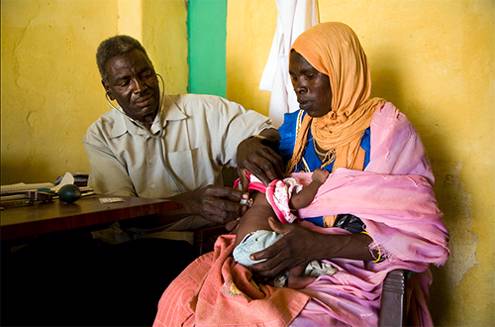
The odds that a woman in Sub-Saharan Africa will die from complications related to pregnancy and childbirth is one in 20, compared to one in 6,250 in the developed world, resulting both from high fertility and maternal mortality rates. The majority of the countries in this region have experienced armed conflict since the end of the Cold War, and this poor health performance may in part be due to the detrimental effects of armed conflicts. A new project entitled Armed Conflict and Maternal Health in Sub-Saharan Africa led by Gudrun Østby, is one of five Young Research Talent projects which have received funds from the Research Council of Norway under the funding scheme for Independent Basic Research Projects (FRIPRO).

Women in Bongouanou, Côte d'Ivoire, during a prenatal medical consultation. Photo: UN Photo/Hien Macline.
The primary objective of the project is to improve our understanding of how conflict affects maternal health and how to improve maternal health in post-conflict societies, which is crucial for formulating humanitarian policies to improve women's health after conflict.
We will study how civil war affects various health indicators as well as investigate what factors impact maternal health in post conflict societies. We combine statistical analysis of secondary data, such as national surveys, with qualitative analysis through fieldwork in Burundi, the DR Congo, and Liberia. While many studies focus exclusively on the direct effects of specific interventions to improve maternal health such as e.g. family planning services and the provision of obstetrical care, we broaden the scope and also consider the more distant impact of political, socioeconomic, and cultural factors. Furthermore, this project is the first systematic attempt to study determinants of maternal health in post-conflict societies at the local (subnational) level.

The research team from PRIO. From left: Gudrun Østby (project leader), Henrik Urdal, Chi Primus Che and Andreas Forø Tollefsen. Photo: Julie Lunde Lillesæter/PRIO.
In addition to Gudrun Østby, the project team includes PRIO researchers Henrik Urdal, Andreas Forø Tollefsen and Chi Primus Che, as well as Theodora-Ismene Gizelis from Essex University and Philip Verwimp from the Solvay Brussels School of Economics and Management.





